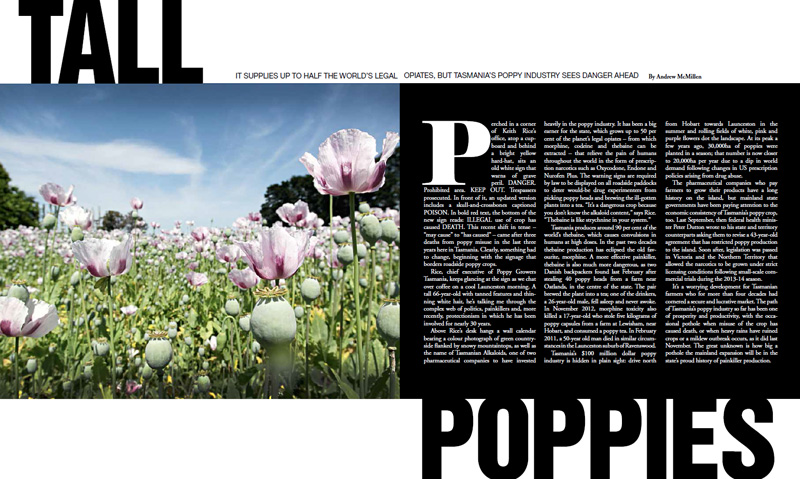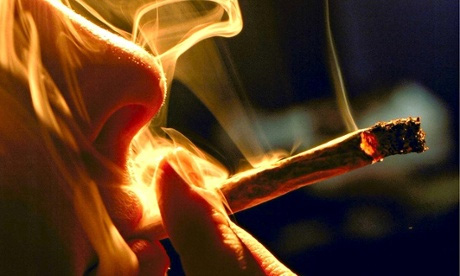The Weekend Australian Magazine story: ‘Tall Poppies: Tasmanian opiates’, March 2015
A story for the March 7 issue of The Weekend Australian Magazine. Excerpt below.
It supplies up to half the world’s legal opiates, but Tasmania’s poppy industry sees danger ahead.
Perched in a corner of Keith Rice’s office, atop a cupboard and behind a bright yellow hard-hat, sits an old white sign that warns of grave peril.DANGER. Prohibited area. KEEP OUT. Trespassers prosecuted.
In front of it, an updated version includes a skull-and-crossbones captioned POISON. In bold red text, the bottom of the new sign reads: ILLEGAL use of crop has caused DEATH. This recent shift in tense — “may cause” to “has caused” — came after three deaths from poppy misuse in the last three years here in Tasmania. Clearly, something had to change, beginning with the signage that borders roadside poppy crops.
Rice, chief executive of Poppy Growers Tasmania, keeps glancing at the sign as we chat over coffee on a cool Launceston morning. A tall 66-year-old with tanned features and thinning white hair, he’s talking me through the complex web of politics, painkillers and, more recently, protectionism in which he has been involved for nearly 30 years.
Above Rice’s desk hangs a wall calendar bearing a colour photograph of green countryside flanked by snowy mountaintops, as well as the name of Tasmanian Alkaloids, one of two pharmaceutical companies to have invested heavily in the poppy industry. It has been a big earner for the state, which grows up to 50 per cent of the planet’s legal opiates — from which morphine, codeine and thebaine can be extracted — that relieve the pain of humans throughout the world in the form of medicines such as OxyContin and Nurofen Plus. The warning signs are required by law to be displayed on all roadside paddocks to deter would-be drug experimenters from picking poppy heads and brewing the ill-gotten plants into a tea. “It’s a dangerous crop because you don’t know the alkaloid content,” says Rice. “Thebaine is like strychnine in your system.”
Tasmania produces around 90 per cent of the world’s thebaine, which causes convulsions in humans at high doses. In the past two decades thebaine production has eclipsed the old favourite, morphine. A more effective painkiller, thebaine is also much more dangerous, as two Danish backpackers found last February after stealing 40 poppy heads from a farm near Oatlands, in the centre of the state. The pair brewed the plant into a tea; one of the drinkers, a 26-year-old male, fell asleep and never awoke. In November 2012, morphine toxicity also killed a 17-year-old who stole five kilograms of poppy capsules from a farm at Lewisham, near Hobart, and consumed a poppy tea. In February 2011, a 50-year old man died in similar circumstances in the Launceston suburb of Ravenswood.
Tasmania’s $100 million dollar poppy industry is hidden in plain sight: drive north from Hobart towards Launceston in the summer and rolling fields of white, pink and purple flowers dot the landscape. At its peak a few years ago, 30,000ha of poppies were planted in a season; that number is now closer to 20,000ha per year due to a dip in world demand following changes in US prescription policies arising from drug abuse.
The pharmaceutical companies who pay farmers to grow their products have a long history on the island, but mainland state governments have been paying attention to the economic consistency of Tasmania’s poppy crop, too. Last September, then federal health minister Peter Dutton wrote to his state and territory counterparts asking them to revise a 43-year-old agreement that has restricted poppy production to the island. Soon after, legislation was passed in Victoria and the Northern Territory that allowed the narcotics to be grown under strict licensing conditions following small-scale commercial trials during the 2013-14 season.
It’s a worrying development for Tasmanian farmers who for more than four decades had cornered a secure and lucrative market. The path of Tasmania’s poppy industry so far has been one of prosperity and productivity, with the occasional pothole when misuse of the crop has caused death, or when heavy rains have ruined crops or a mildew outbreak occurs, as it did last November. The great unknown is how big a pothole the mainland expansion will be in the state’s proud history of painkiller production.
To read the full story, visit The Australian.

